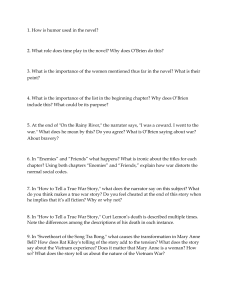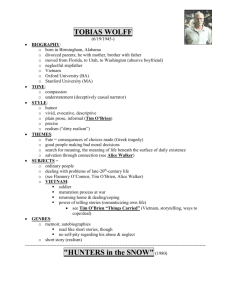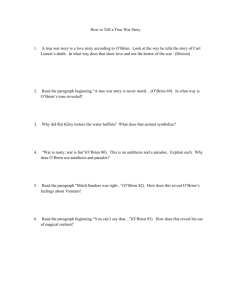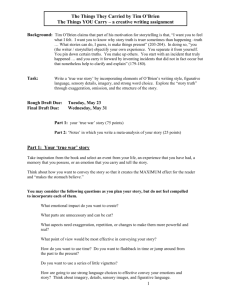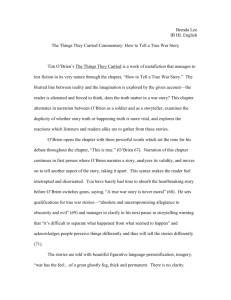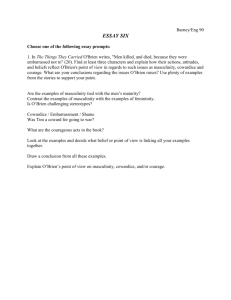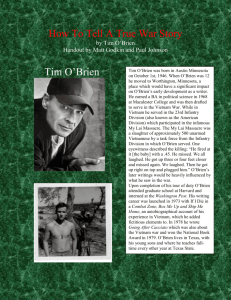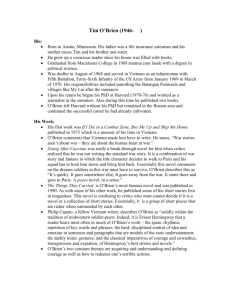Characters
advertisement
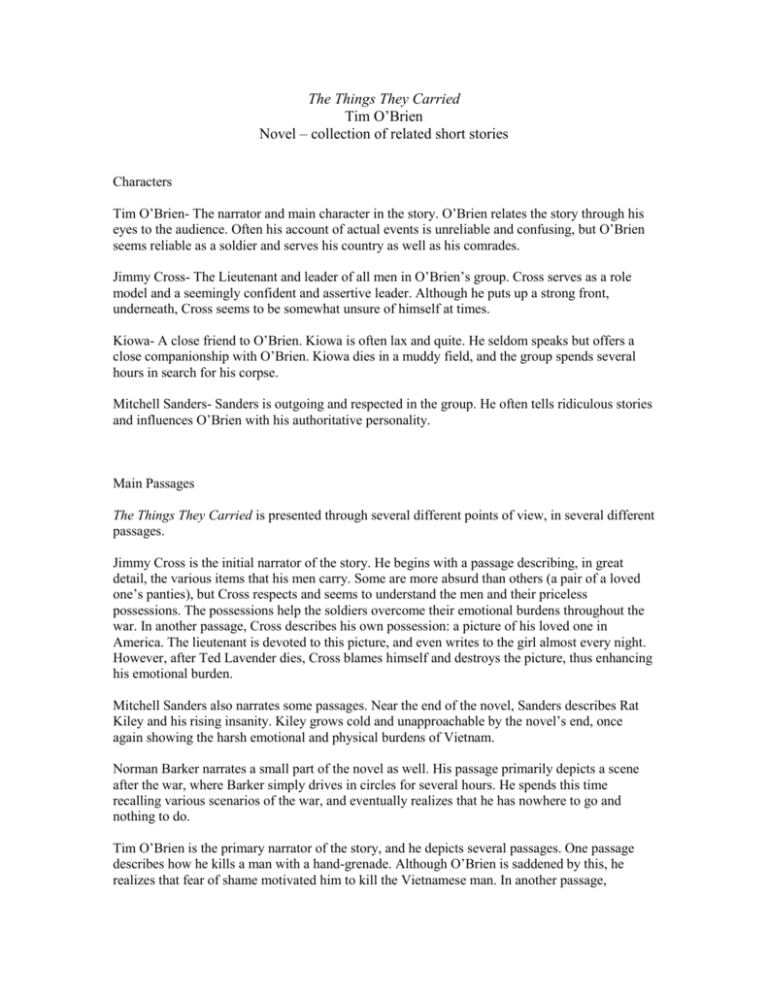
The Things They Carried Tim O’Brien Novel – collection of related short stories Characters Tim O’Brien- The narrator and main character in the story. O’Brien relates the story through his eyes to the audience. Often his account of actual events is unreliable and confusing, but O’Brien seems reliable as a soldier and serves his country as well as his comrades. Jimmy Cross- The Lieutenant and leader of all men in O’Brien’s group. Cross serves as a role model and a seemingly confident and assertive leader. Although he puts up a strong front, underneath, Cross seems to be somewhat unsure of himself at times. Kiowa- A close friend to O’Brien. Kiowa is often lax and quite. He seldom speaks but offers a close companionship with O’Brien. Kiowa dies in a muddy field, and the group spends several hours in search for his corpse. Mitchell Sanders- Sanders is outgoing and respected in the group. He often tells ridiculous stories and influences O’Brien with his authoritative personality. Main Passages The Things They Carried is presented through several different points of view, in several different passages. Jimmy Cross is the initial narrator of the story. He begins with a passage describing, in great detail, the various items that his men carry. Some are more absurd than others (a pair of a loved one’s panties), but Cross respects and seems to understand the men and their priceless possessions. The possessions help the soldiers overcome their emotional burdens throughout the war. In another passage, Cross describes his own possession: a picture of his loved one in America. The lieutenant is devoted to this picture, and even writes to the girl almost every night. However, after Ted Lavender dies, Cross blames himself and destroys the picture, thus enhancing his emotional burden. Mitchell Sanders also narrates some passages. Near the end of the novel, Sanders describes Rat Kiley and his rising insanity. Kiley grows cold and unapproachable by the novel’s end, once again showing the harsh emotional and physical burdens of Vietnam. Norman Barker narrates a small part of the novel as well. His passage primarily depicts a scene after the war, where Barker simply drives in circles for several hours. He spends this time recalling various scenarios of the war, and eventually realizes that he has nowhere to go and nothing to do. Tim O’Brien is the primary narrator of the story, and he depicts several passages. One passage describes how he kills a man with a hand-grenade. Although O’Brien is saddened by this, he realizes that fear of shame motivated him to kill the Vietnamese man. In another passage, O’Brien fights alongside his close friend, Kiowa, and later watches him die. O’Brien is overwhelmed with grief and terror at the sight of this. In a passage shortly after, O’Brien and his fellow soldiers search the entire field for Kiowa’s body, and finally it is uncovered. O’Brien feels mixed emotions such as anger, fear, relief, and love. He is once again emotionally burdened by the war. Setting Two major settings, Vietnam and Massachusetts, are presented in this novel. Vietnam has several tense sub-settings, such as a muddy war zone field, the dense forest where Curt Lemon dies, and the mountainous range where Mitchell Sanders supposedly “hears the rocks.” These various Vietnam settings take place in the late 1960s, and help create the tense and often confusing tone that O’Brien presents. Vietnam is portrayed as a cruel and punishing place, one that is hellish yet, in the end, rewards O’Brien with knowledge and pride. Massachusetts offers a safe haven for O’Brien, and often when he is under stress, his thoughts wander back to his home town. Quotes “Over here, every sin is fresh and original.” (80) This quote is mentioned to represent the entirely different world that the soldiers are living in at the time. The rules are much different in Vietnam, and the war changed men’s morals. “It’s safe to say that in a true war story, nothing is absolutely true.” (82) O’Brien says this just before discussing a war story. The quote undermines his credibility as a narrator and also relates to the theme of truth and stories in the novel. O’Brien discusses how a true war story will actually have untrue details, but in essence is true anyway. Quotes like these seem to intentionally confuse the audience. “Story-truth is truer sometimes than happening-truth.” (179) O’Brien once again attempts to explain his reason for lying to the audience. He explains that although the actual details of his stories are untrue, the underlying causes are very true. The principles of the war displayed in O’Brien’s stories seem to be very true, despite his untrue stated facts.
